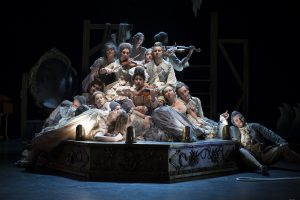
There is a one-hundred per cent chance of you cringing in your seat witnessing the dicey issues addressed in the Concordia Department of Theatre’s The Islands of Love.
Three plays of French dramatist Pierre de Marivaux’s, exemplifying theatre at its best in the 18th century, have been adapted and directed by Cristina Iovita, a PhD student of Concordia’s Humanities program, as well as founder and artistic Director of Le Théâtre de l’Utopie.
Ambitiously staged for the first time as a one-act play, The Islands of Love tackles the Enlightenment era at its zenith. Think silver-lined coats, mauve bobby-laced shoes, voluminous gray wigs and ridiculously tight corsets.
The play is dissected into three parts: The Dispute, The Colony and The Slaves’ Island. Each segment addresses sensitive topics such as love and fidelity, gender equality, marriage and societal hierarchy.
In The Dispute, the notions of love and fidelity are doubted as the Prince and his lover Hermione fall in and out of love. A powerful storm forces the couple to re-evaluate the notion of any kind of natural relationship between the two sexes.
In The Colony, a battle of the sexes inevitably transpires. Women settlers who have been excluded from political activities take the sword and declare war on their husbands. This segment is particularly comical with actors brandishing posters, jousting with their male companions, and basically making fools of themselves while addressing the radical feminism they are faced with. Arthénice and Madame Sorbin, two leaders of the female revolution, attempt to convince their followers of giving coquetry the cold shoulder so as to attain real citizenship. The result: women cannot forgo looking good for the sake of politics.
In the final segment, The Slaves’ Island, further conflict ensues. The Prince and his beloved Hermione are swept to the Slaves’ Island where the aristocratic couple are forced to obey their former servants, Harlequin and Carisa. Emotions run high but fraternity and friendship rule over revenge when Harlequin takes pity on his former master and all the characters revert back to their normal lives.
Each segment of this one-act play is thought-provoking while being light-hearted. Huge issues are handled with a smirk, a grin or a jest. However, the issues are tackled for far too long, leaving the audience restless.
But then, there are the costumes. Every character is heavily powdered, as would be expected, and clad in beautiful, richly woven fabrics, with the women dressed in baby pink gowns, while the men strut their stuff in long stockings and large hats.
Some costumes really were mesmerizing like Lina’s (Madame Sorbin’s daughter) pearl grey dress with mild black accents.
The performances are mostly believable and outright hilarious—Madame Sorbin prances around on stage with a poster in her hand, demanding political equality with a scowl on her face as she throws caution to the wind.
On the other hand, some of the acting left something to be desired. The love-acting between the Prince and Hermione in the first segment, for example, felt too staged and bordered on caricature, making the entire scene seem more impractical than funny.
On the whole, nonetheless, the production demonstrates a subtle yet masterful approach to pivotal issues that cannot be ignored in today’s society — or in the 18th century, for that matter. We see quintessential characters from the play being continually confronted by new, radical thoughts.
And that’s the morale of the story: if you want society to progress, you need to battle the old with the new.
The Islands of Love plays at the D.B. Clarke Theatre at 1455 de Maisonneuve Blvd. W. until Dec. 1. Regular tickets cost $10 and student or senior priced tickets are $5. To reserve tickets, contact [email protected].




